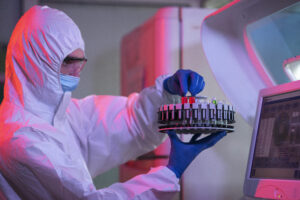Preimplantation Genetic Diagnosis (PGD) ensures the genetic health of embryos therefore preventing hereditary diseases. PGD also offers more than 99% accuracy in gender selection.
Pre-implantation genetic testing allows individuals with a significant inherited disease in their family to prevent its transmission to their offspring. This procedure also allows the selection of the gender of your baby while ensuring a secure and safe treatment.
Preimplantation Genetic Diagnosis
Preimplantation Genetic Diagnosis (PGD) ensures the genetic health of embryos therefore preventing hereditary diseases. PGD also offers more than 99% accuracy in gender selection.
Pre-implantation genetic testing allows individuals with a significant inherited disease in their family to prevent its transmission to their offspring. This procedure also allows the selection of the gender of your baby while ensuring a secure and safe treatment.
Why consider PGD?
PGD is recommended for the following cases:
- Patients wanting to know their baby’s gender before implantation
- Patients with a history of multiple miscarriages
- Patients at risk of passing on chromosomal abnormalities or monogenic disorders (e.g., sickle cell disease)
- Patients with repeated IVF failures
- Patients with sperm abnormalities
- Patients with age-related fertility issues
Stages of PGD Treatment
Stage 1: Initial Contact
Once you contact us, a patient coordinator will provide a comprehensive overview of the process, discuss necessary tests, and understand your personal situation.
Stage 2: Pre-Treatment Blood Tests
Before planning your treatment cycle, you need to undergo specific tests to determine your fertility and ovarian reserve. These tests should be done between 1 and 6 months prior to starting treatment, on day 2 or 3 of your menstrual period.
Stage 3: Beginning the Procedure
Upon completing the required tests and determining the start date for your IVF treatment, you will begin a monthly contraceptive pill to regulate your menstrual cycle. You will receive a personalized medication protocol in an easy-to-read calendar format.
Stage 4: Arrival at the Clinic
Arrive on day 1 of your menstrual period or day 10 of your cycle. Your coordinator will arrange an appointment to assess follicle growth and prepare for the hCG trigger injection when follicles are mature.
Stage 5: Oocyte Retrieval (Egg Collection)
Scheduled 36 hours after the hCG injection, egg collection is performed under light sedation using ultrasound guidance. Your partner will provide a sperm sample at this time.
Stage 6: Embryo Culture
The Embryologist will monitor fertilization and embryo development. Embryos are incubated to maintain a consistent environment.
Stage 7: PGD Genetic Analysis
On day 3, embryos are biopsied for genetic diagnosis. Results are available in 2 days, prior to embryo transfer.
Stage 8: Embryo Transfer
You will decide how many embryos to transfer. The procedure, performed under ultrasound guidance, does not require sedation. A full bladder is necessary. Post-transfer, rest for at least 2 hours.
Stage 9: Pregnancy Testing
12 days after the embryo transfer you need to have an hCG blood test. If you can’t have an hCG test, then you can have a urine test on day 14. If your pregnancy is confirmed, you need to continue using the prescribed medications. If the pregnancy test is not positive you need to stop taking medications.
For further support and guidance, please contact your coordinator.









